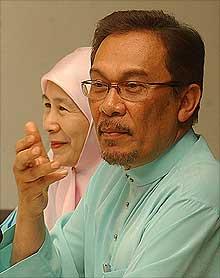
Anwar starts long march to be prime minister
Elisia Yeo, Malaysiakini
Aug 8, 05 11:35am
Anwar Ibrahim is storming back onto Malaysia's political landscape with ambitions to transform the nation's race-based party system, as the centrepiece of a campaign to become prime minister.
Anwar Ibrahim is storming back onto Malaysia's political landscape with ambitions to transform the nation's race-based party system, as the centrepiece of a campaign to become prime minister.
The former deputy premier last week took another step towards putting the ugly saga of his sacking and imprisonment behind him, winning damages and an apology from the then-police chief who famously beat him after his 1998 arrest.
Anwar, 57, is legally barred from holding political office until 2008 after being convicted of corruption - a charge he says was manufactured to prevent him threatening the dominance of his former mentor Dr Mahathir Mohamad.
But he told AFP in an interview that even if the government times the next general elections to ensure he is excluded, a win by the opposition Keadilan, led by his wife Wan Azizah, could see him claim the top job. "If the public, the Malaysian electorate, endorses you, what does it matter whether I contest or not," he said. His advisers say that if Keadilan established a majority with the support of its allies, it could appoint an interim prime minister until Anwar's ban expired and he contested a by-election.
"It is a decision of the party in power. So if they want my role, then the party has to decide and the people have to back the party," Anwar said. His inability to stand for office would only make "a difference for a few months", in the event of a Keadilan poll victory, he said. "Just a few months. If the party wins, then the party will decide."
Breaking the racial equation
Despite the brave words, Keadilan suffered a crushing defeat in the 2004 elections and faces a daunting task in unseating the Umno party which has ruled Malaysia since independence in 1957. However, Anwar is their best hope for success and after his release from jail last September, thanks to the overturning of a sodomy conviction which was part of the charges against him, he is now emerging from the political wilderness.
Since winning his freedom, Anwar travelled extensively to re-establish his networks both domestically and abroad. But his frequent trips back to Malaysia, which have seen him address nationwide political rallies with calls for democratic reform, are increasing in momentum and creating waves here, despite media blackouts. Anwar has emphasisised Keadilan's multi-racial nature - a rare phenomenon in a political environment where most parties are race-based.
The ruling Barisan Nasional coalition is headed by the Malay-based Umno, with other component parties representing the minority Chinese and Indian communities. Anwar has argued for dismantling the system, which has led to tension over the privileges granted to bumiputeras. He said that only a multi-racial party can give fair representation to all Malaysians, and ensure economic prosperity across the board.
"Notwithstanding what happens during the elections or after, I think that is the single most important contribution in contemporary times, to break the racial equation and the racial divide which has been exploited by these party leaders," he said.
Building the alternative government
Anwar, who has ruled out rejoining Umno, said it was only after completing a recent tour of the nation that he decided to throw in his lot with Keadilan and begin the herculean task of building an alternative government. The tour saw him reach out to minority Chinese and Indian communities, while also talking to the Malay heartland. It is "only now that I decided it's time for me to state (this)," he said. "I know it's going to be difficult, it's going to be really tough for me, but if we are able to overcome it, then the entire political landscape will change."
His most recent visit to Malaysia last week saw him deliver speeches with the most bite yet. At the heart of his attacks is the National Economic Policy, implemented in 1970 to address the economic gap between the majority Malay population and the successful Chinese community which dominates business.
The issue is a hot topic in Malaysia, where even Umno has said that the implementation of the affirmative action policy has not worked and has made Malays too reliant on handouts. Anwar argues that the policy has led to discrimination against minority groups and funnelled money to the ruling elite, while leaving the Malay grassroots impoverished.
"I sense people are a bit more willing to come and listen, partly because I provoke them with this issue of Malay rights," he said. While Malays want an assurance their interests are being protected, they are now prepared to discuss reforms, he said. "And I think it's a major radical shift in the thinking of our people." - AFP
No comments:
Post a Comment